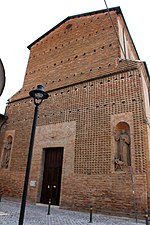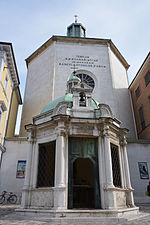Province of Rimini
Province of RiminiProvinces of Italy

The province of Rimini (Italian: provincia di Rimini) is a province in the Emilia-Romagna region of Italy. The provincial capital is the eponymous city of Rimini. The province borders the independent Republic of San Marino. As of 2019, the province has a population of 339,437 inhabitants over an area of 921.77 square kilometres (355.90 sq mi), giving it a population density of 357 inhabitants per square kilometre. The built-up urban area of Rimini had a population of 147,578 inhabitants within city limits. There are 26 comuni (singular: comune) in the province.
Excerpt from the Wikipedia article Province of Rimini (License: CC BY-SA 3.0, Authors, Images).Province of Rimini
Via della Fiera, Rimini
Geographical coordinates (GPS) Address Website Nearby Places Show on map
Geographical coordinates (GPS)
| Latitude | Longitude |
|---|---|
| N 44.05 ° | E 12.566666666667 ° |
Address
Palacongressi di Rimini
Via della Fiera
47900 Rimini
Emilia-Romagna, Italy
Open on Google Maps











